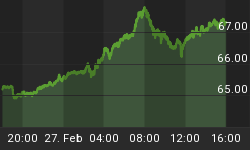Here's another take on the inflation/deflation debate from Council on Foreign Relations senior fellow and Financial Times columnist Sebastian Mallaby:
Forget Jesus and ask the hedge funds
The US stimulus debate features two warring camps. The Obama administration insists that a failure to stimulate will open the door to a double-dip recession. Its foes retort that continued stimulus could scare investors into dumping US Treasuries. Team Obama invokes the recent run of poor economic data, which point to a risk of renewed slowdown. The critics recall that the Treasury market dipped unnervingly last year, and that foreign central banks were rumoured to be tired of funding US deficits.
Faced with finely balanced dilemmas, some Americans are wont to ask: "What would Jesus do?" In this case a variant may help: "What would hedge funds do?"
Hedge-fund traders typically consider not just the probability of alternative scenarios; they look at the magnitude of the consequences flowing from each of them. If a trader thinks a market has an equal chance of falling or rising - but that a fall, if it happens, will be larger than any potential rise - the trader will seize upon that asymmetrical pay-out. He will bet on the market falling, and his actions may be self-fulfilling.
For the stimulus debate, this hedge-fund logic has clear implications. Even though the odds of a double-dip or a bond-market rout may be roughly equal, bond-market trouble would probably have larger consequences. Therefore the prudent policy is to rein in the stimulus.
What makes the prospect of a bond-market rout more frightening? To begin with, course correction would be harder. If we are heading for a double-dip, the evidence will come in, data release by data release. There will be time for the central bank to respond, time even to reopen the option of a stimulus.
To be sure, monetary and fiscal stimulus operates with a lag: ideally, you treat preventatively. But the problem of getting behind the curve is far greater with respect to market crises, which can come out of a clear sky, suddenly and with a vengeance. Once the crisis begins, falling bond prices drive up the cost of servicing the national debt, compounding the budget mess that caused the crisis in the first place. And whereas the International Monetary Fund and its allies can sometimes break the resulting vicious cycle in a small country such as Greece, they are not in a position to underwrite the $8,600bn US Treasury market.
More than that, a Treasury crisis could potentially have consequences more catastrophic by far than the loss of two or three percentage points of output. Lost output certainly matters, not least because workers shut out of the job market for too long tend to become permanently discouraged. But the discrediting of the global reserve asset would have ramifications all around the world - financial and political.
Investors everywhere would be left without their moorings. They have constructed their portfolios on the assumption that Treasuries are the risk-free asset; if their benchmark is destroyed, they will scramble for other stores of value - German bunds? Gold? - disrupting normal price relationships across the financial system. The disorientation could cause a repeat of the post-Lehman Brothers freeze-up. Nobody would know whom or what to trust. And unlike after Lehman, the US government, chief architect of the 2008 bail-out, would itself be compromised. This time really would be different.
Politically, the consequences could be almost as serious. Because of Treasuries' status as a safe haven, the US government has benefited from capital inflows during moments of geopolitical stress. Even when Russia or China opposed US policies in such moments, they frequently enabled those policies by shifting assets into US Treasuries - thus they denounced the 2003 invasion of Iraq, but they also financed it. Because of these safe-haven flows, the US has been able to make military and foreign-policy decisions without worrying that its access to financing might dry up. If Treasuries lose their credibility, US leaders may no longer be able to take this privilege for granted.
In short, a crisis in the Treasury market would be seismic, and the mere possibility should terrify policymakers. This is the tail risk that deserves to wag the policy dog. It is a scenario that implies costs that would be so huge that they demand to be a part of the debate over the stimulus.
Some thoughts:
-
Agreed, the global markets losing faith in Treasury bonds would be the end of the road for the U.S. We'd be in worse shape than Greece, having to actually live within our means but without a big brother to bail us out during the transition.
-
It's interesting to see the mainstream press toy with the idea that inflation and deflation aren't the only, or even the biggest risks that a society runs when it borrows beyond a certain point. The real danger is a sudden currency crisis in which bond investors just say "no more," and head for the exits en mass. Since fiat currency is only a shared hallucination, this kind of meme can become a self-fulfilling prophecy.
-
But the idea that there are better and worse policy choices is overoptimistic. At this point there are only two alternatives, both of which lead eventually to the same place: If the US eases immediately, the kind of bond market meltdown described above becomes probable. If we switch to austerity, states and cities from coast to coast will default on their debt, sending us into a deflationary black hole -- and forcing a new round of easing. All roads lead to the printing press.















